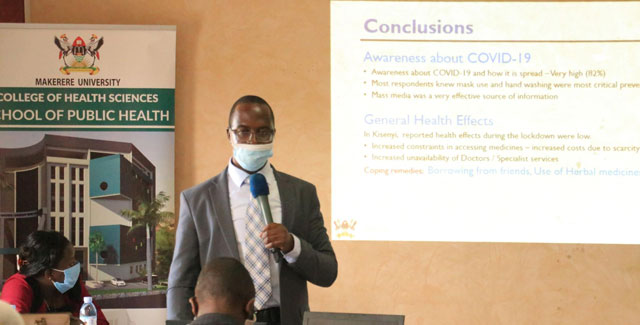
Kampala, Uganda | THE INDEPENDENT | One in ten parents living in Kampala’s Kisenyi slum has confessed to having no hope of returning their children to school when educational institutions reopen. This is according to results of a study released by the Makerere University School of Public Health on Wednesday.
The survey which was conducted in September among 434 heads of families in Kisenyi parish, a Kampala Central Division slum aimed to assess the social effects of the COVID-19 lockdown in slums, people’s coping strategies and lessons for improving the livelihood.
The participants according to Dr Aloysius Ssenyonjo, a lecturer in the Department of Health Policy Planning and Management who was the Principal Investigator were asked about their experience of the lockdown. He says they considered only those that had spent there six months or more in the area after the lockdown was instituted in March.
He says the majority of the participants said that their children’s learning was grossly affected whereby 39.4% reported children didn’t access learning materials whereas others said because of the structure of their households their children at 18.4% while studying from home.
Only about 20% acknowledged being able to access some form of learning from the newspapers and television or through their parents. As a result of this, the researchers say many are contemplating not taking their kids back to school citing loss of focus and getting involved in other activities that have distracted them. One in every ten people they interviewed hinted on this.
Abbasi Kiyingi, the LCI Chairperson of Kiti zone in Kisenyi, said that with the continued closure, parents started looking for jobs such as maids, cleaners and other causal jobs for their children.
Apart from the impact on education, the researchers also studied the effect on water prices and access, accessibility to toilet facilities and health where they found no reasonable effect on access to WASH facilities but when it comes to health services 35% acknowledged borrowing money to access care whereas 18% resorted to herbal remedies for their ailments.
More than 53. 7% suffered from anxiety mainly arising from the fear of how to survive economically with the majority of them being involved in petty jobs where they earn hand to mouth.
However, generally, the people of Kisenyi are well versed with COVID-19 prevention information and how the virus is spread. The average age of the participants was 40 years whereby 80.7% have lived in the slum for over five years.
********
URN
 The Independent Uganda: You get the Truth we Pay the Price
The Independent Uganda: You get the Truth we Pay the Price


